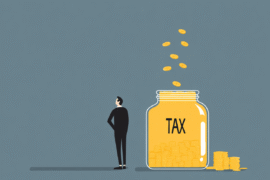This article may contain references to products or services from one or more of our advertisers or partners. We may receive compensation when you click on links to those products or services. Nonetheless, our opinions are our own.
The information presented in this article is accurate to the best of our knowledge at the time of publication. However, information is subject to change, and no guarantees are made about the continued accuracy or completeness of this content after its publication date.
A bonus, like a holiday gift or a reward for doing a good job, can feel like a sudden boost in your finances. It’s important to know how your bonus will affect your taxes before you decide how to spend the extra money. Bonuses are taxed differently than regular income, which can have a big effect on how much you take home.
We’ll go into detail about how bonuses are taxed and help you understand the tax rates and deductions that apply. You’ll know how much of your bonus you can keep and what to expect when it’s time to file your taxes.
- Highlights
- Are bonuses taxable by both the federal government and the state?
- Different Methods for Withholding Taxes on Bonuses
- Percentage Method
- Aggregate Method
- How Your Income Level Affects Your Bonus Tax Rate
- Smart Strategies for Managing Bonus Income
- What to Know About State Taxes and Bonuses
- Tips for Maximizing Your After-Tax Bonus Income
- How to Report Bonuses on Tax Returns
- Conclusion
- Frequently Asked Questions
- Recommended Reads
Highlights
- Bonuses are taxed differently from regular pay.
- There are two main IRS methods: percentage and aggregate.
- State taxes and income brackets affect how much you keep.
- Good planning helps you maximize your after-tax bonus.
- FAQs provide helpful answers for first-time earners.
Are bonuses taxable by both the federal government and the state?
Yes. Both the federal government and your state tax bonuses. The IRS calls bonuses “supplemental income,” which means they are taxed in a different way than your regular pay. The tax rate for bonuses at the federal level is usually a flat 22%. This could be higher than the rate you pay on your regular income.
States also have their own rules for how to tax bonuses. Depending on how much money you make and the tax laws in your area, these rules may be different. You can plan better and keep more of your bonus money if you know how these taxes work.
Different Methods for Withholding Taxes on Bonuses
Bonuses are referred to as “supplemental wages” by the IRS. This classification means they may be taxed differently than your standard wages. Employers typically use one of two methods to withhold taxes from your bonus:
| Method | Description | Withholding Rate |
|---|---|---|
| Percentage Method | A flat percentage is withheld from the bonus | 22% (Federal) |
| Aggregate Method | Bonus is taxed at your normal tax rate | Variable |
Percentage Method
With the percentage method, your employer withholds a flat federal tax rate of 22% from your bonus. For example, if your bonus is $1,000, $220 will be withheld, leaving you with about $780 before any other deductions.
Aggregate Method
Under the aggregate method, your bonus is added to your most recent paycheck, and the total is taxed at your usual rate. This could result in a higher withholding amount if the combined income pushes you into a higher tax bracket. For example:
| Bonus Amount | Withholding Method | Estimated Take-Home After Tax |
|---|---|---|
| $1,000 | Percentage Method | $780 |
| $1,000 | Aggregate Method | $650 (Hypothetical Example) |
Knowing which method your employer uses is important, as it directly impacts your bonus amount. Review your pay stub and consult HR to confirm how your bonus is being taxed so you can plan accordingly.
Voted "Best Overall Budgeting App" by Forbes and WSJ
Monarch Money helps you budget, track spending, set goals, and plan your financial future—all in one app.
Get 50% OFF your first year with code MONARCHVIP
How Your Income Level Affects Your Bonus Tax Rate
Your income level plays a major role in determining how much tax you’ll pay on your bonus. If you’re already in a higher income bracket, adding a bonus to your regular wages could increase your overall tax rate.
Considerations
- Flat Rate Tax: Bonuses paid separately may be taxed at a flat rate of 22%.
- Combined Method: Bonuses added to wages may result in a higher total tax rate.
- State Taxes: Your state of residence can also impact your bonus taxation.
| Income Level | Bonus Tax Rate |
|---|---|
| $0 – $40,525 | 10% – 12% |
| $40,526 – $86,375 | 22% |
| $86,376 – $164,925 | 24% |
| $164,926+ | 32%+ |
Knowing how your bonus affects your income level helps you make better decisions, like saving more money ahead of time or increasing your tax withholdings to avoid surprises at tax time.
Smart Strategies for Managing Bonus Income
Receiving a bonus is exciting, but thoughtful planning can help you get the most from it.
Tax Allocation
Because bonuses often lead to more taxes being withheld, consider setting aside 25 – 30% of the amount for taxes. When you file your return, this can help cover any unexpected payments.
Boost Your Finances
Use your bonus to strengthen your financial position. Consider the following options:
- Eliminate high-interest debt: Pay off credit cards or loans with high interest rates.
- Invest in Yourself: Spend on education or career training.
- Build Emergency Savings: Add to a fund for unexpected expenses.
- Save for Specific Goals: Set money aside for a vacation, new car, or home improvement.
| Smart Strategy | Considerations |
|---|---|
| Tax Allocation | Set aside 25–30% |
| Debt Repayment | Focus on high-interest balances |
| Savings Boost | Grow your emergency fund |
| Invest in Yourself | Courses, certifications, training |
What to Know About State Taxes and Bonuses
In addition to federal taxes, state and local taxes may apply to your bonus. Each state has its own rules for taxing supplemental income.
Common state tax scenarios:
- Flat Tax Rate: Some states apply a fixed rate to bonuses, which may differ from regular income tax.
- Progressive Taxation: In states with tiered tax brackets, a bonus may push your income to a higher level.
- Withholding Variations: Employers may withhold more or less than required, leading to a tax bill or refund when you file.
| State | Flat Tax Rate on Bonuses (%) | Progressive Tax Bracket for Bonuses (%) |
|---|---|---|
| California | 10.3 | 1 – 13.3 |
| Texas | 0 | 0 |
| New York | 9.62 | 4 – 10.9 |
Knowing your state’s tax policies can help you estimate your take-home bonus and prepare accordingly.
Tips for Maximizing Your After-Tax Bonus Income
To make the most of your bonus:
- Prioritize Financial Goals: Pay off debt, increase savings, or invest.
- Balance Enjoyment and Responsibility: Reserve a small portion for discretionary spending, but focus on long-term benefits.
- Maximize Investment Opportunities: Contribute to retirement or education savings plans.
Consider These Options
- Retirement Accounts: Increase 401(k) or IRA contributions.
- Stock Market: If appropriate, invest in stocks or mutual funds.
- Education Savings: Use a 529 Plan to save for future educational expenses.
A bonus can serve as a foundation for long-term financial stability if used wisely.
How to Report Bonuses on Tax Returns
Accurate reporting of your bonus income is essential during tax season. Here’s what to do:
- Get the Right Forms: Your employer will provide a Form W-2 showing the bonus amount.
- Include in Total Income: Report your bonus as part of your annual income.
- Understand Tax Rules: Know whether the percentage or aggregate method was used.
- Use the Correct Form: File your taxes using IRS Form 1040.
- Seek Professional Advice: If unsure, consult a tax expert to ensure accurate reporting.
Conclusion
To manage your money well, you need to know how your bonus is taxed. Bonuses are extra money and can be taxed at a different rate than your regular salary, which can change how much you actually get to keep. You can better plan how much money you need to set aside for taxes and how to use your bonus if you learn about the two main tax methods: percentage and aggregate.
Being proactive with your bonus can help you achieve long-term financial stability, whether you use it to pay off debt, save for the future, or invest. Be aware of the tax rates in your state, plan how to best use your bonus, and use tools like retirement accounts or education savings plans to get the most out of your extra money.
You can make sure your bonus works for you by keeping up with tax rates and smart ways to manage it. This will help you reach your financial goals and deal with unexpected costs or chances that come up.
Frequently Asked Questions
What is a bonus, and how is it different from regular income?
A bonus is extra compensation provided in addition to your regular salary. It may be performance-based, seasonal, or tied to company goals. Unlike regular income, bonuses are not guaranteed and are often irregular.
How are bonuses taxed in the United States?
Bonuses are considered supplemental income and are taxed federally. Employers can use either the percentage method or the aggregate method to withhold taxes.
What is the percentage method for taxing bonuses?
The percentage method withholds a flat 22% from your bonus for federal income tax. It simplifies tax calculations for employers.
What is the aggregate method for taxing bonuses?
The aggregate method adds your bonus to your last paycheck and taxes the total at your regular income tax rate, which may lead to higher withholding.
Do state taxes apply to bonuses as well?
Yes. Most states also tax bonuses, though rules vary. Some states use a flat rate; others apply progressive rates. A few states, such as Texas, do not tax income.

Reviewed and edited by Albert Fang.
See a typo or want to suggest an edit/revision to the content? Use the contact us form to provide feedback.
At FangWallet, we value editorial integrity and open collaboration in curating quality content for readers to enjoy. Much appreciated for the assist.
Did you like our article and find it insightful? We encourage sharing the article link with family and friends to benefit as well - better yet, sharing on social media. Thank you for the support! 🍉
Article Title: Bonus Tax Explained: How Much of Your ,000 Bonus Do You Actually Keep
https://fangwallet.com/2025/07/25/bonus-tax-explained-how-much-of-your-1000-bonus-do-you-actually-keep/The FangWallet Promise
FangWallet is an editorially independent resource - founded on breaking down challenging financial concepts for anyone to understand since 2014. While we adhere to editorial integrity, note that this post may contain references to products from our partners.
The FangWallet promise is always to have your best interest in mind and be transparent and honest about the financial picture.
Become an Insider

Subscribe to get a free daily budget planner printable to help get your money on track!
Make passive money the right way. No spam.
Editorial Disclaimer: The editorial content on this page is not provided by any of the companies mentioned. The opinions expressed here are the author's alone.
The content of this website is for informational purposes only and does not represent investment advice, or an offer or solicitation to buy or sell any security, investment, or product. Investors are encouraged to do their own due diligence, and, if necessary, consult professional advising before making any investment decisions. Investing involves a high degree of risk, and financial losses may occur including the potential loss of principal.
Source Citation References:
+ Inspo
There are no additional citations or references to note for this article at this time.












































